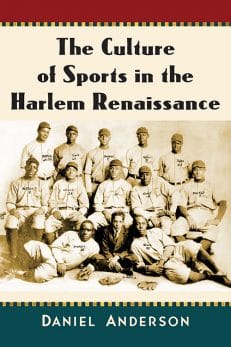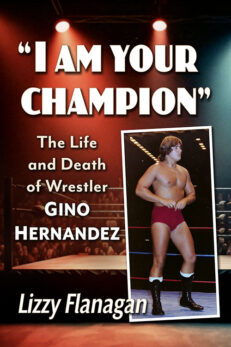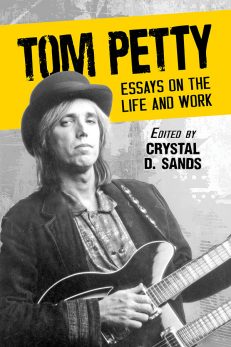Introduction
Crystal D. Sands 1
No! in Thunder: American Wildflowers Reborn (Stephen Newton) 7
Place, Race and Mutability: Everyman’s Hillbilly Rhetoric (Mara Lee Grayson) 23
Tom Petty’s “Magic” of Success and the Craft of a Writer (Crystal D. Sands) 40
A Career in Review (Spencer Rowland) 53
Psychedelic Strangeness: “Don’t Come Around Here No More” and Other Magical Music Videos (Tom Zlabinger) 66
Running Down an American Dream: Tom Petty and the Tour T-Shirt (Lauren Alex O’Hagan) 79
Fashioning a Rock Star: Petty’s Clothing Choices and Their Connections (Megan Volpert) 99
Contributing to Success: Tom Petty, the Heartbreakers and Baby Boomer Behavior (Rebecca A. Caton) 114
Pretty Woman, American Girl: The Female in American Popular Music, 1960–2000 (Pamela P. O’Sullivan) 127
Rebels, Refugees and American Girls: A Study of Tom Petty’s Political Mojo (Alessandra Clayton Trindle) 137
Something Good: An Exploration of the Issue of Cover Bands (Karen Friend) 147
Fears, Frustrations and Knowing How It Feels: The Emotional Signifiers of Tom Petty’s Songs (Nate Bauer and Shye Gilad) 158
Peace and Petty: Music’s Healing Power (Shawn W. Murphy) 173
About the Contributors 191
Index 193
Review Fix chats with Tom Petty: Essays on the Life and Work editor Crystal Sands, who lets us know why the book is a special one and why Tom Petty’s legacy is a multifaceted one.
Review Fix: What inspired the creation of this book?
Crystal Sands: I was inspired to write about Tom Petty after his death. I was heartbroken when I heard the news, as I was one of those people who felt Tom Petty had written the soundtrack to my life. I had grown up with him, and his death was a devastating blow. My husband and I spent about five months listening to Tom Petty music only–and for many hours a day. It was a part of my healing process for sure, but I kept having the urge to do more, to write. Shortly after his death, I wrote this piece which appeared at Huffington Post, but I wanted to write more.
I am a writing professor, and I spend my life studying people’s writing processes. As I listened to Tom Petty’s music every day and got to know more of his deep tracks, I became fascinated with his writing process. How could someone be that successful, that effective? The essay I contributed to this book is on Petty’s writing process, and writing it was a part of my healing. I came to realize that others had the same need to heal through writing, only on different topics. And that’s kind of how this book was born–out of a need for healing.
Review Fix: What makes the music of Tom Petty worthy of a book like this in your opinion?
Sands: I think Tom Petty was such a successful songwriter that he simply deserves a place at the highest level in the American Canon. His work is as important as Dylan’s, I think, and Dylan’s work has received deep academic study and treatment. Some of the pieces in this collection provide a kind of deep academic study. Others provide a more biographical examination. But, in all, I feel like this collection should be the first of many that explore the power of Tom Petty’s life, work, and music.
Review Fix: What was the writing process like?
Sands: I enjoyed it so much, but it was tough as well. I had never edited a collection with such diversity in topics and authors, and trying to bring things together with some balance was a challenge. I also struggled tremendously writing my own essay on Tom Petty’s writing process. I wanted it to be beautiful, and, as a writer, that kind of pressure can be terrible. But I learned so much through all of it, and that’s really what you hope for–to have experiences that help you grow as a human. Digging into Tom Petty’s life and work to this kind of depth definitely helped me grow as a human.
Review Fix: How do you feel Tom Petty’s music will be looked at in a few decades?
Sands: I think it will last, that it will be a part of the Canon, and that it will continue to inspire, give hope, and comfort. I think Tom Petty’s deep understanding of humans and what makes us tick and what gives us hope will ensure that his music continues to be highly regarded.
Review Fix: Favorite Tom Petty song? Why?
Sands: This is so tough. I usually just have a top-five list because it’s so hard to pick. But I think it might be “Two Gunslingers.” I feel like the lyrics speak to inner turmoil people can have. It’s a beautiful song and speaks to me deeply. Tom Petty was a poet. That song is one piece of evidence. I had just finished the book when the An American Treasure collection was released. When my copy came in the mail and I tore into to find images of Tom Petty’s writing process for that song in the CD booklet, I just broke down and cried. It was a powerful moment for me.
Review Fix: What did you learn through the writing process that you weren’t expecting?
Sands: I definitely gained a deeper understanding of how Tom Petty’s work and his persona appealed to so many different people in so many different walks of life. The first time I read through everyone’s essays for the rough draft, I realized that Tom Petty was who we all needed him to be–and he somehow did this so well.
Review Fix: What are your goals for the book?
Sands: I hope that people will give it a chance and will find they learn something new about Tom Petty. I feel like there’s an essay in this collection for everyone. We cover everything from Tom Petty’s politics to Tom Petty tribute bands. I hope it’s fun for readers. Most importantly, I hope readers can see how much love and respect for Tom Petty went into this book.
Review Fix: How would you like it to be remembered?
Sands: I hope that this book is just one of the first of many critical explorations of Tom Petty’s life and works. He was such an important figure in our culture. I hope this just helps get the conversation started.
Review Fix: What’s next?
Sands: I’ve just been working on smaller projects since this book, but I just started working on a book-length project on the Bangor Symphony Orchestra, one of the longest-running community orchestras in the United States.







